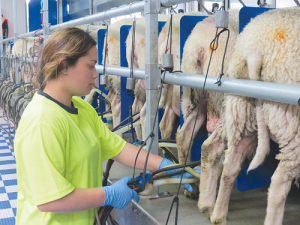Blue River Dairy eyes new markets after China success
Sheep infant nutrition maker Blue River Dairy is hoping to use its success in China as a springboard into other markets in future.
 Younger people’s quest for unique foods will be a key driver in the growth of the sheep milk industry, says US expert Davie Thomas.
Younger people’s quest for unique foods will be a key driver in the growth of the sheep milk industry, says US expert Davie Thomas.
Younger people's quest for unique and interesting foods will be a key driver in the growth of the sheep milk industry.
That’s the view of Professor David Thomas, from the US, who spoke at last week’s dairy sheep conference in Palmerston North.
Thomas has been researching sheep at the University of Wisconsin for 40 years, spending at least half that time on dairy sheep.
In the unique foods category sheep milk products fit perfectly – notably cheese. The last 20 years has seen a marked increase in imports of sheep cheeses.
“The US imports about 50% of world exports of sheep milk cheese and we currently produce a very, very small amount of it. So there is potential for growth in our domestic market. The main countries we import from are Italy, Spain, Greece and France.”
But the US dairy sheep industry is small and most of the sheep flocks are relatively small, averaging about 150 ewes. New Zealand has more and larger flocks than the US.
The US dairy sheep industry is mainly in the Midwest, Wisconsin and the north-east.
“Interestingly, New York would probably be the biggest state for dairy sheep production,” he says.
A large sheep dairy industry is developing in Canada, especially southern Ontario and Quebec. However, hard data is lacking: there are no national records on the dairy sheep industry in all North America.
Sluggish growth seen in the US dairy sheep industry is a pity because sheep milk is very ‘efficient’: it has a much higher solids content than either cow or goat milk.
“It takes five kilograms of sheep milk to make a kilo of sheep milk cheese, whereas it takes 9-10 kg of cow or goat milk to make a similar amount of cheese.”
A big challenge for dairy sheep farmers is getting a market for their raw product, says Professor Thomas. Many people are interested in coming into the industry, but not to process the product; instead they want to produce raw milk.
“The challenge is finding processors who are willing to try sheep milk and develop artisan cheeses out of that sheep milk,” Thomas explains.
Another challenge is getting production to levels where they provide a reasonable return on investment. Thomas says there is nothing in the US to provide impetus to lift production.
He’s aware of the recent initiatives in NZ to improve the genetics of the dairy sheep industry, an excellent move that will improve the profitability of the NZ industry, he says.
And he is impressed that NZ has developed sheep milk powders, something not done in the US.
Former Fonterra executive Alex Turnbull has been appointed CEO to lead all five Yili Oceania Business Division companies in New Zealand.
Fonterra executive René Dedoncker is leaving the co-operative later this year to lead Australian agribusiness Elders.
Alliance Group and the Southland Stags rugby team have joined forces in a partnership that will see the the meat co-operative's farmgate brand feature on players' team kits and replica jerseys.
Fonterra's plan to expand its organic programme to the South Island is being well received by farmers, the co-op says.
Voting has started for the renewal of DairyNZ's milksolids levy.
The most successful catchment groups in NZ are those that have 'a source to sea' approach.

OPINION: Here w go: the election date is set for November 7 and the politicians are out of the gate…
OPINION: ECan data was released a few days ago showing Canterbury farmers have made “giant strides on environmental performance”.